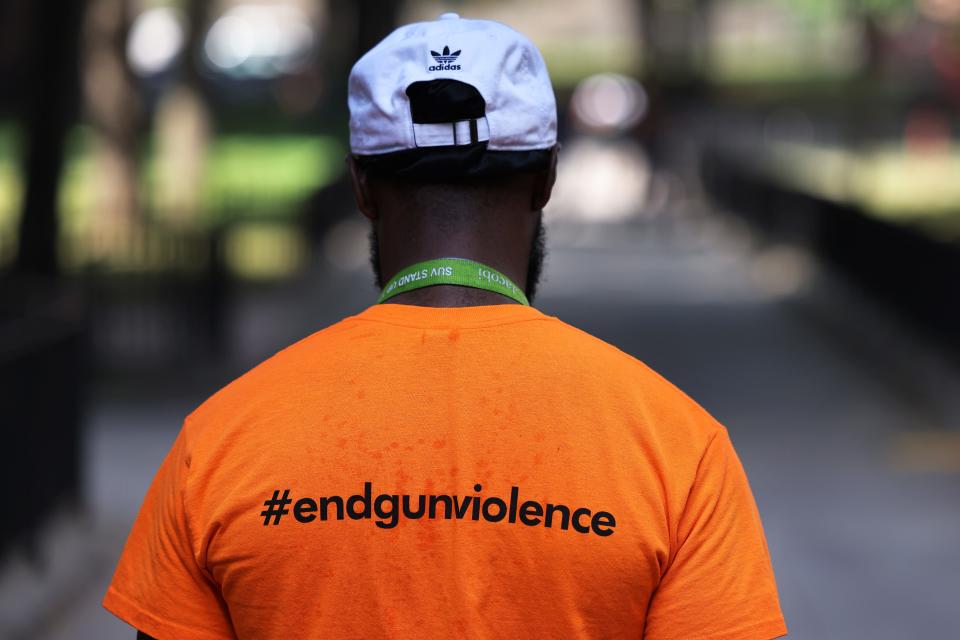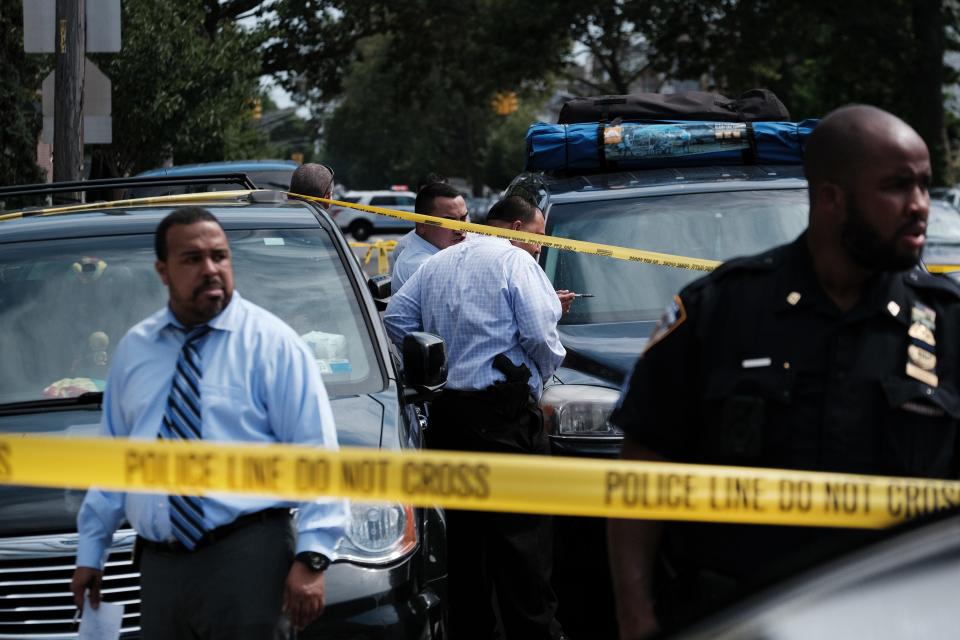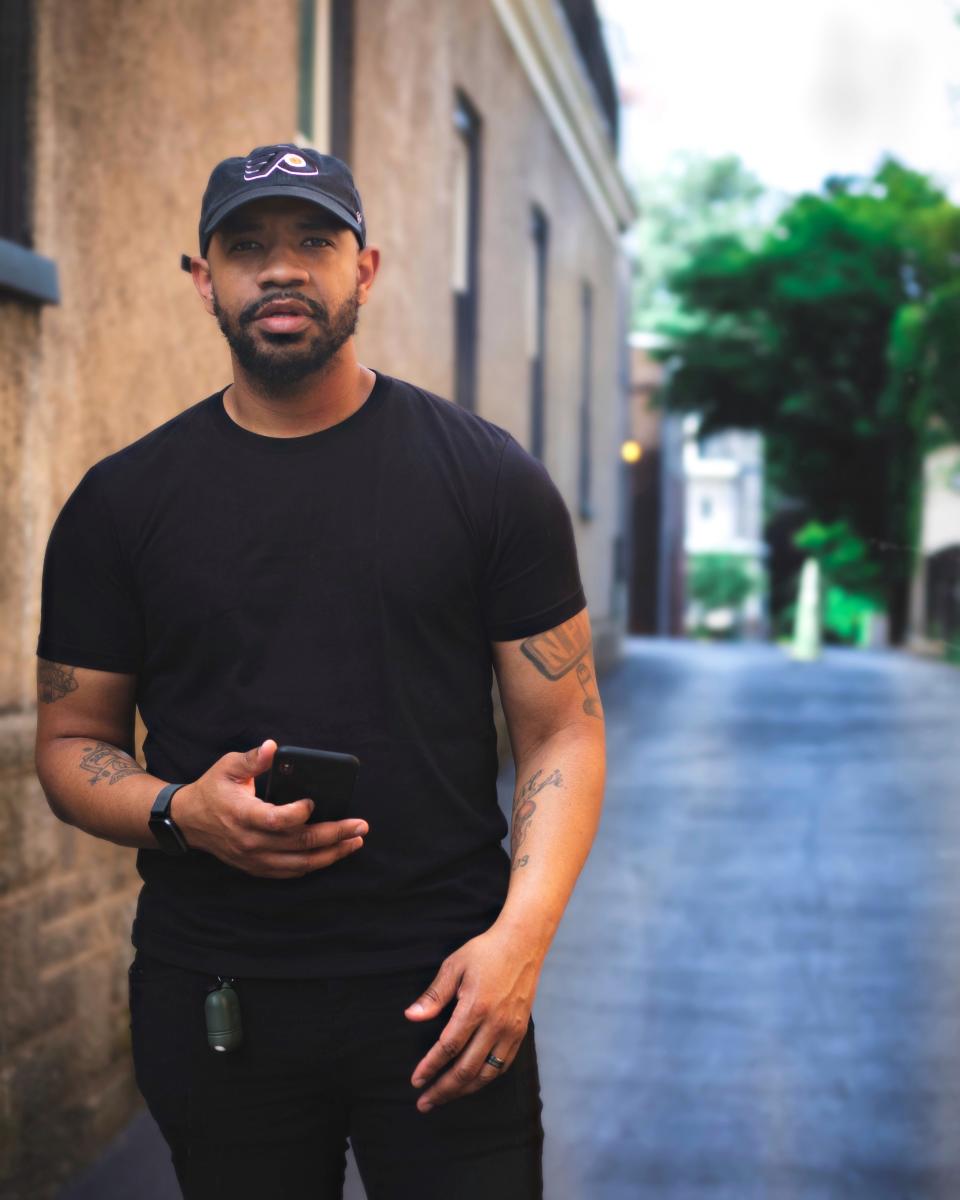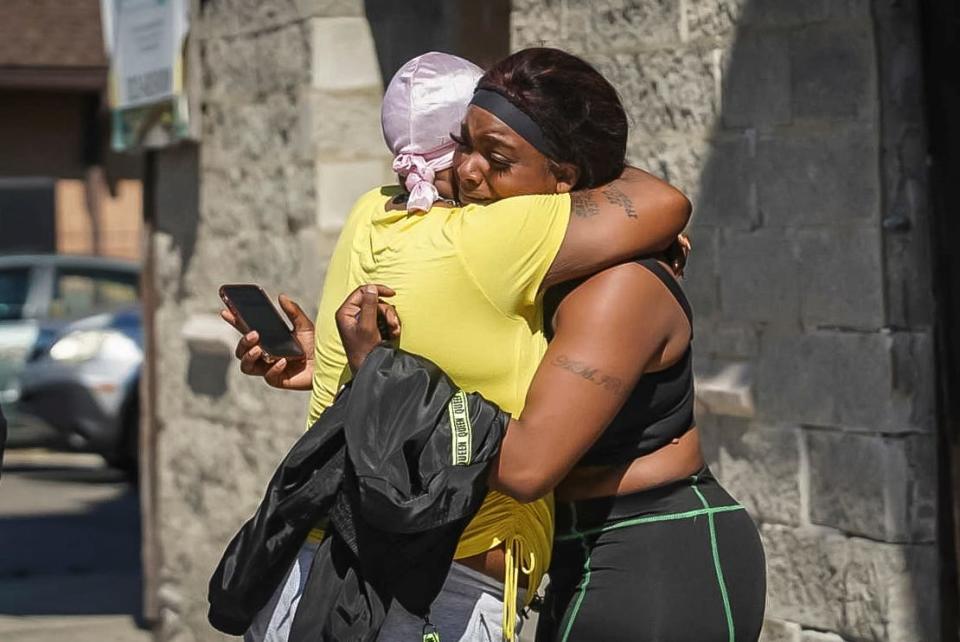'I can't believe the numbers': Mass shootings, homicide rates, gun sales hit highest levels since 1990s
Londan Hill was sitting at the kitchen table in a family friend's Cleveland-area home when two bullets ripped through the wall, piercing his neck.
He staggered into the living room before collapsing in front of his mother, blood gushing from his fatal wounds.
He was 13.
"He went on a trip and he came back dead," said Londan's grandmother, Paris Hill, who lives in Chicago. "He's a child. He's a child. He watched the Disney channel. How does a 13-year-old get shot?"

Hill's Aug. 9 death in Cleveland Heights makes him one of the more than 100 people killed in the Cleveland area so far this year, a sharply higher tally than the 84 homicides for the same period last year.
Both shootings and homicides are up dramatically from last year across the United States due to what experts, activists and family members said is a toxic stew of post-COVID 19 lockdowns, economic uncertainty and a flood of guns. Complicating matters: social-media taunting that allows young people to broadcast their intentions, fueling the cycle.
"We're seeing the same thing every urban community is seeing: Murder is up, violent crime is up," said Houston police Sgt. Joe Gamaldi. "We're seeing it in real-time on the front lines."
Through Sept. 2, more than 13,700 people had been shot dead in the United States in 2021, a 13% increase compared to the same time in 2020 and a nearly 37% increase compared to that same period in 2019, according to statistics compiled by the Gun Violence Archive.
And it's not just that there are more shootings. More people are being shot in each incident, in part due to the availability of extended magazines and easy-to-carry "bullpup" style semi-automatic rifles, said Mark Bryant, executive director of the Gun Violence Archive, which tracks gun violence nationally using a combination of police statistics and media reports.
According to the group's statistics, the nation has seen 464 mass shootings — defined as four or more people shot in a single incident — so far in 2021, compared to 386 by this time last year, a 15.5% increase. For comparison, 2019 had 417 mass shootings in the entire year, according to GVA's definition.
Portland alone had nine shootings in 16 hours on Aug. 31, the police department reported.
"It's going up, click, click, click, every year," Bryant said. "The big underlying factor is we added a boatload of guns on the street, and you've got more people carrying guns."
The number of homicides is approaching those seen in the late 1980s and early 1990s, which prompted the passage of the 1994 Crime Bill that allowed cities to hire 100,000 more police officers, allocated nearly $10 billion for new prisons and created a federal three strikes provision mandating life in prison without the possibility of parole for anyone convicted of at least three serious violent felonies or drug trafficking.
That law, and the changes it brought to policing nationally, is also blamed by many racial justice activists for creating and perpetuating a cycle of poverty, desperation, fatherlessness and violence, particularly in urban, Black communities that saw heavy-handed enforcement compared to suburban white neighborhoods.
Current homicide rates are 15 deaths per 100,000 residents nationally, compared to 28 per 100,000 in 1993, according to Council on Criminal Justice, a nonpartisan think tank. But the council also noted that murder rates through the first half of 2021 are 16% higher than the same period last year, and 42% higher than in 2019.
"In response to elevated rates of homicide, the authors conclude that urgent action is required. As the pandemic subsides, pursuing crime-control strategies of proven effectiveness and enacting needed policing reforms will be essential to achieving prompt yet durable reductions in violent crime in our cities," the organization said in a July 29 report.
FBI statistics indicate nearly 40 million guns were legally sold in 2020, the highest level recorded since it began tracking the data in 1998. Bryant said millions of legally purchased guns often end up in the hands of criminals and gang members through theft.

In August, nine suspected gang members were indicted on charges they stole guns from cars in the Atlanta area and drove them to New York City to sell illegally. More than 1,000 guns have been stolen from Atlanta-area cars this year alone, according to police.
Bryant said suburban residents have been legally buying guns because they feel unsafe, but fail to lock them up, which means they get stolen and sold illegally, fueling the cycle.
Community activists said the influx of federal coronavirus stimulus payments helped exacerbate conflicts that previously might have ended in punches thrown and a broken nose.
With anyone 18 and older qualifying for last year's $1,200 cash payments, "I’m going out, I’m buying all the guns, all the bullets," said Maryum Patterson, 50, of the Cleveland Peacemakers Alliance. “Old beefs were rekindled, people were just mad about little stuff."
Patterson tries to reduce community violence by visiting gunshot victims in their hospital beds, pleading and begging with them in that "golden moment" not to seek revenge. Her own son was shot in the back twice in 2017, caught in the crossfire of a drive-by shooting while waiting for the bus home from work. Recently, Patterson met with ER workers to discuss the rise in violence, and victims from two shootings were rushed in during the 90-minute meeting.
"I can't believe the numbers are this high, and lately it's all a double shooting, a triple shooting," Patterson said. "This isn’t about gang beefs. These are young kids, 15,16. They’re online on social media, they drop their location on the map, and meet up and guess what happens? It’s on, on sight."

The same thing is happening in Philadelphia, says the Rev. Carl Day, whose daily street-outreach efforts now include trying to persuade young men to end escalating social media feuds.
"Back in the day, you might have had a problem, it's in front of two or three people and they might have had a confrontation and it was taken care of. But now, if you lose a fight on camera, you feel like 20,000 people watched you lose. That's where the young people exist, and there's zero to none conflict resolution, so the only way they know to resolve conflict is through violence," said Day. "They tell me, 'I hear you pastor, but they just killed my friend, so we have to do what we have to do.'"
Like Patterson, Day said federal COVID-19 relief payments fueled gun purchases among young men who ordinarily don't have so much money.
In Philadelphia, the number of homicides through the end of August -- 357 -- is already higher than in any full year in the past decade, according to city police.

"You've had this perfect storm, in a terrible way," said Day, 36, who served prison time for violent crime before founding the Culture Changing Christians church. "When you have access to guns, the capital to buy them, the influence of social media, you've got a giant toxic destructive cocktail. They just don't have anything to live for, so why would they worry about if they die?"
The same is true for teens living in Chicago's notoriously violent South Side, said Lamar Johnson, 31, an activist with St. Sabina’s BRAVE Youth Leaders program.
"This is all they know," he said. "When you have to get produce from a gas station, your school is poor, everything around you is deprivation, how do you feel value about life?"
Trump, Biden offer differing approaches
Both former President Donald Trump and President Joe Biden tried to address the violence, albeit with very different approaches.
Last summer, Trump sent hundreds of federal agents into cities, including Chicago, St. Louis, Kansas City and Albuquerque, as part of what he dubbed Operation LeGend, named for four-year-old LeGend Taliferro, who was fatally shot while sleeping at his Kansas City home in June 2020.
But Trump's move came during massive Black Lives Matter protests in which millions of Americans demanded, in part, that police officers act like less of an occupying force in Black neighborhoods and some mayors demanded Trump withdraw the federal agents. The short-lived effort, which appears to have ended about a month before Biden took office in January, had mixed results, with some short-term decreases in shootings recorded in St. Louis, for example. It is unclear, however, how much of the credit claimed by Operation LeGend would have been done by federal agents anyway.
Gamaldi, the Houston police officer, is also the national vice president of the Fraternal Order of Police, a national police union. He said gun violence had been rising since 2019 and argued that the greater problem is a growing sense of lawlessness nationally.
Drugstore chain Walgreens, for instance, has closed at least 19 stores in the San Francisco area over the past five years as managers contended with rampant theft that police could not control.
Gamaldi said many police officers would prefer a return to more aggressive tactics often called the "broken windows" model, in which officers focus their attention on high-crime areas and target people who commit minor violations such jaywalking or littering, on the theory that minor crimes create a sense of disorder, which then breeds more serious crimes. The FOP is the nation's largest police union, representing about 356,000 officers nationally.
"Nobody wants us stopping frisking and everyone in their community. Even we don't want to do that. It really has to make sure that it's targeted and that it's directed at people who are committing crimes, who are openly committing crimes. And frankly, there's plenty of that going around," Gamaldi said. "If we did that, you would start seeing a difference in a few months. But my god, how long are we going to wait? How much of this are we going to accept?"
Gamaldi said many police officers are also frustrated that efforts to reduce the use of cash bail, which is often blamed for keeping poor people incarcerated before they are convicted, has led to a revolving door in which career criminals are repeatedly caught, released and reoffend.
Biden's anti-crime approach has focused on reducing the spread of stolen guns, providing more funding for community anti-violence programs and helping people being released from jail or prison so they are less likely to reoffend.
As chairman of the Senate Judiciary Committee at the time, Biden wrote most of the 1994 crime bill, which provided a surge of new police officers who used the broken windows model, particularly in New York City under former Mayor Rudy Giuliani.
In 1996, then-first lady Hillary Clinton defended that law, signed by President Bill Clinton, saying that inner-city gangs needed to be targeted the same way the mob had been.
"They are often the kinds of kids that are called superpredators. No conscience, no empathy. We can talk about why they ended up that way, but first, we have to bring them to heel," she said.
During her 2016 presidential campaign, Clinton was repeatedly confronted by Black voters who said her comments were offensive and inaccurate. Clinton apologized, but some voting experts say the sentiment may have cost her the 2016 presidential election by causing otherwise liberal-leaning Black voters to stay home.
Biden has also apologized for the devastation the policy wrought on Black communities and is using his executive powers to investigate local police departments accused of racist policing, along with telling communities they can use federal stimulus funds for anti-crime community outreach and hiring new police officers.

Community activists say solutions should come from within
Social justice activists in the most affected communities say they prefer Biden's approach compared with the Trump administration but worry it won't stop the shootings. They also said sending more cops into violence-plagued cities fails to address the underlying drivers of that violence: generations of institutional racism, systemic poverty and the unaddressed consequences of slavery.
Johnson, the Chicago activist, teaches the young Black men he works with about structural racism and economic discrimination so they can better understand why their communities look the way they do, and what role they could play in reversing violent trends.
Johnson said he remains frustrated the federal government could magically make $2 trillion appear to assist Americans with the pandemic, but community-based organizations with demonstrated track records of efficacy in reducing inner-city violence are left squabbling over small grants.
"Until it's Black kids killing white kids, nobody cares," Johnson said.
Generations of mistrust between police and those communities means few residents are willing to trust law enforcement, said Day, the Philadelphia pastor, meaning the answers must come from within.
"There's a level of community accountability we need. There's only so much police officers can do. So if the police respond to a murder and no one will tell them anything, what can they do?" Day said. "We have to get back to that mentality of the village. We've got to start caring about these kids because if we don't, we are going to look up and these kids are burning the village down."
In Chicago, Londan's grandmother is still struggling with his death. Two teenagers, 14 and 16, have been arrested and charged with murdering Londan. Authorities have declined to reveal their evidence or any possible motive but say the shooting was not random.
Hill, 57, buried him last weekend, 18 months after unknown gunmen in Chicago killed another one of her teenaged grandchildren as he walked to the store. Jahari Hill, 19, was shot in the face and chest as he walked along the sidewalk on the West Side on April 18. He was one of five people killed in Chicago on a weekend that also saw at least 28 others wounded in shootings, including a 2-year-old.
"To this day, nothing has come of it. Nobody has been arrested. And to me, that means everybody in the community aren't doing their part," she said of Jahari Hill's death. "Do I think there should be more officers? I do. But not the ones they have now. We need better police. We need them to train them to do more than walk around a gun. Because it is a community problem. And that community problem killed my grandkids."
This article originally appeared on USA TODAY: Crime and guns: Across US, homicides, mass shootings skyrocket

